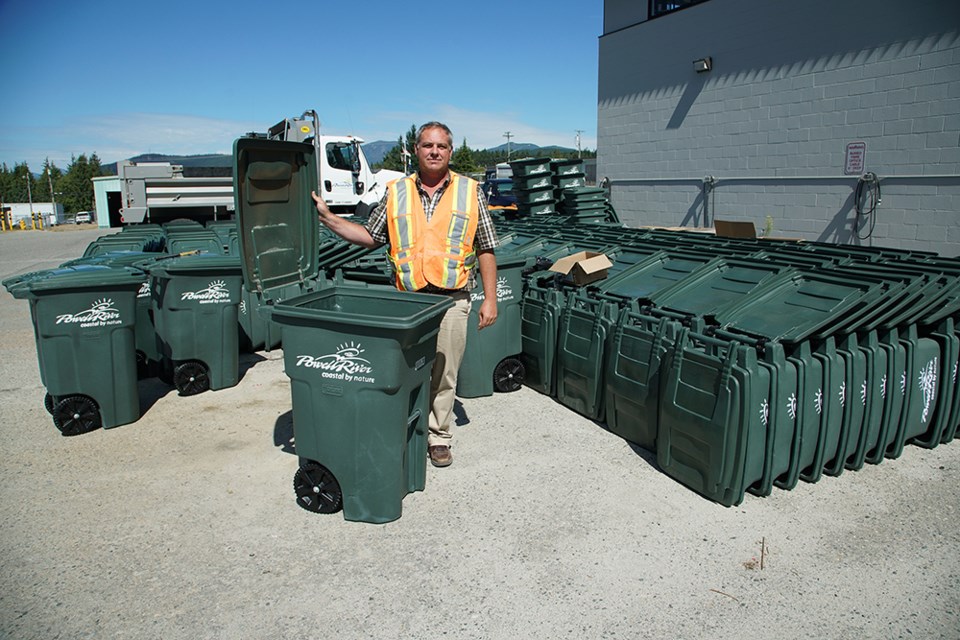qathet Regional District (qRD) will be sending a report on composting to other local governments.
At the April 15 committee of the whole meeting, directors received an organics processing facility analytical report that provides an historical account of efforts made to date by the qRD to establish a local composting facility and to offer an analytical summary of composting facilities, specifically regarding odour and pest management.
Electoral Area E director Andrew Fall said the report provides good background and helped him understand some of the history, especially prior to his role on the board.
Fall said the report mentions that in 2015, a community survey was promoted through a solid waste newsletter mailed out to all registered households and businesses in the qRD. The survey was also promoted in print and radio ads and was available online and in paper copy. 794 people responded to the survey and 95 per cent of respondents stated they were in support of diverting organic material out of the waste stream, according to the report.
Fall asked if results were available to the public. Let’s Talk Trash member Abby McLennan said survey results are not publicly available to her knowledge.
“We just received them back and analyzed them,” said McLennan. “They are currently not available on the website. I don’t believe they were made public other than reporting back on them.”
Manager of asset management and strategic initiatives Mike Wall said the request for proposals (RFP) process the regional district is currently undergoing involves looking for somebody to process the district’s food scraps, et cetera, to make compost. While the Townsite Ratepayers Society has expressed concerns about the processing of biosolids from the consolidated wastewater treatment plant, that was not in the organics RFP, said Wall.
In terms of the potential location of an organics processing site, Wall said in the RFP process, qRD could not possibly understand where sites may be.
“It’s part of the process to go through and understand who is willing to come to our region and engage with us to possibly have a facility and tell us where they think it may work,” said Wall. “That will turn into some level of engagement.”
The committee carried a motion to forward the report to the City of Powell River and Tla’amin Nation for awareness and purposes.
Status quo leaves footprint
According to the report, with no local landfill, waste from the qathet region is shipped 700-plus kilometres to central Washington State, leaving a significant carbon footprint. Compostable materials, such as food scraps and yard waste constitute approximately 40 per cent of the residential waste stream, the report stated, therefore diversion of organic materials is essential to reach the high-diversion targets identified in the region’s solid waste management plan (SWMP), while also resulting in a reduction of greenhouse gas emissions.
The report states that any negotiated agreement between qRD and a company selected to plan, design, finance, construct, operate and maintain an organics processing facility in the region will contain detailed health and safety standards to ensure the facility is constructed and operated in a manner compliant with all applicable laws and regulations.
The report concludes by stating composting facilities can operate in a relatively odour-free manner. The report stated processing organic material will inherently create some odour but it should not be detectable or a nuisance to neighbours. Successful facilities with robust odour management plans have been able to process organic material with little to no odour complaints, according to the report.
Staff has confidence a facility operating in the qRD that is expected to process 1,000 to a maximum of 3,000 tonnes of feedstock a year will be able to meet odour and pest management expectations.
The report stated establishment of a local composting facility will increase regional resiliency through processing upwards of 40 per cent of the region’s waste locally, while decreasing greenhouse gas emissions and providing valuable soil to support local food security. Continuing to dispose of this valuable resource to landfill or exporting it to an out of region facility are not long-term viable options, the report stated.



